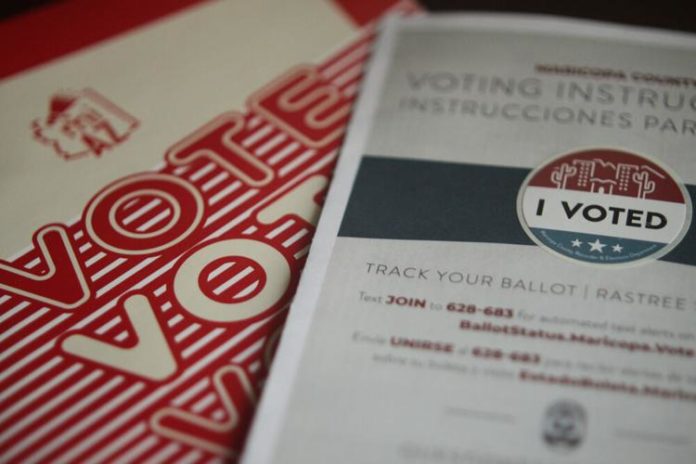
An impassioned effort by some Arizona Senate Republicans to ban the use of ballot drop boxes failed Monday.
Scottsdale Sen. Michelle Ugenti-Rita’s efforts to change a proposal requiring drop boxes to have video monitoring was blocked by fellow GOP senators who knew House Republicans weren’t on board with the harsher proposal. And the whole exercise ended up being in vain after Republican Sen. Paul Boyer of Glendale joined all Senate Democrats in rejecting the measure outright.
Ugenti-Rita said drop boxes are rife with possibilities for “ballot harvesting,” a pejorative term for dropping off completed ballots for other people. The Legislature in 2016 made it a felony to return another person’s mail ballots unless it is for a family member or if the person returning the ballot is a caregiver.
She pointed to recent documentary that alleged thousands of ballots were illegally cast in 2020 battleground states. Fact-checkers have shown the arguments made in “2000 Mules” are full of unsupported allegations that thousands of ballots were illegally deposited into drop boxes.
“If you think ballot boxes contribute to ballot harvesting and can be manipulated, you would ban them, not require that we tape them,” Ugenti-Rita said. “It’s too late at that point.”
But GOP Sen. J.D Mesnard noted that banning drop boxes outright would essentially kill the bill, because there’s no support in the House for going as far as Ugenti-Rita was proposing.
“I don’t want to kill the bill,” Mesnard said. “I want something done in this area that leaves us better. And I strongly disagree that doing nothing is better than having them monitored with cameras.”
The original House measure would have completely banned unmonitored drop boxes, but it did not have the votes to pass so it was watered down to allow counties to set up video monitoring where practical.
About 90% of Arizona voters cast early ballots, either through the mail, at early voting sites, or by using drop boxes put in place by county election officials. Those boxes are most important in the week before an election when there is doubt a mail-in ballot will reach the local election department in time.
Republican Sen. Kelly Townsend had shepherded the bill through the Senate and opposed Ugenti-Rita’s amendment, but ended up voting for it when a formal vote on the amendment was called.
Boyer also teamed up with Democrats to defeat a bill that would have required county recorders to sign off on any settlement the Secretary of State negotiates to end an election-related lawsuit. And he opposed a measure barring local election officials from opening emergency vote centers except in cases of war, civil unrest, or a natural disaster.
Emergency vote centers were widely used in 2020 because of the coronavirus pandemic.
But Boyer did vote with the majority of Republicans for a bill that mandates a person’s voter registration be canceled if election officials are notified the person has left the county. He also backed a measure that bars government agencies from registering someone to vote without their direct request.
Republicans have introduced dozens of election bills this session, many based on the disproven contention that President Joe Biden defeated former president Donald Trump because of election fraud.
The most contentious have failed to pass, but some have made it to Republican Gov. Doug Ducey’s desk.
On Monday, he signed bills that banned same-day voter registration, which is already not allowed and boosting requirements for court officials to notify the Secretary of State when someone is convicted of a felony and loses their voting rights.
Republished with the permission of The Associated Press.













